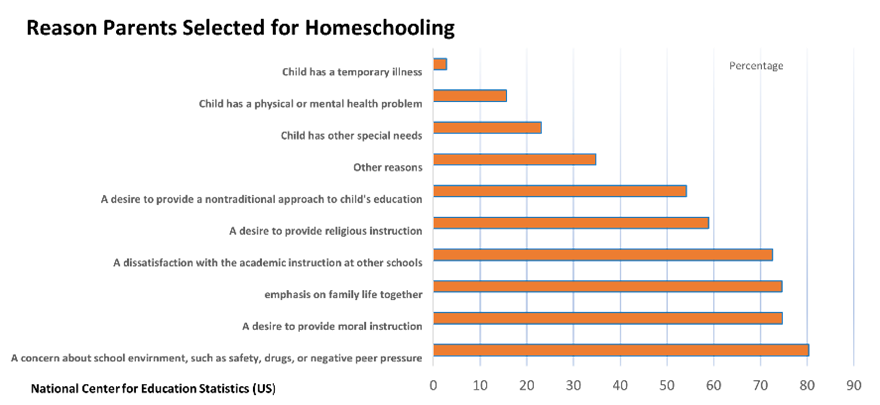Is The Rise And Rise Of Homeschooling Explained By Failing Schools?

Welcome to the second and final article in our mini-series on homeschooling. In the first article we explored the pull of wanting to study at home; customised self-directed education with varying degrees of parental or external support. Advances in technology have been the big enabler with people having access to a wide range of materials anywhere in the world. In this second article, we note a number of issues surrounding the limitations of the education system which seem responsible for people considering alternative provisions like being schooled at home.
Tech Advances Have Changed The Game
In the first article we talked about the impact developments in technology have had in facilitating teaching and learning outside of the traditional school classroom; in terms of myriad innovative methods and materials on the internet. The websites and apps frequently use gamification to enable the children to have fun whilst problem-solving and learning. And as far as socialising, again this can be done remotely through live video chat options, such as Skype.
One of the key benefits for self-directed home learners is that being cognisant of and capable with the latest technology enables them to prosper in the increasingly tech-enabled world, probably more than their peers at school. Home ed students can now access quality education at low cost with a high degree of flexibility and learners can set the pace of their learning rather than adhere to the lowest common denominator in class. As well as supporting students’ learning, technology helps the student prepare for the future in terms of lifelong further education, employability and remote living, because homeschooled children have to be more comfortable with self-management of technology.
Kloodle is one such solution which fits perfectly into this scenario. The reflective learning around skills and character which Kloodle promotes, in turn, enables a greater understanding of what it means to be a ‘human’ and blossom in a tech-infused, AI-pervasive world.
‘Push’ Factors: The Reasons For Leaving School
There are numerous reasons why parents opt for home education and why they want to remove their children from the school system. The list includes: avoiding bullying, exam pressure, stress, special educational needs, not getting into a school of choice, moral or religious preferences, or the school environment.
Historically, the decision to homeschool was heavily influenced by religious or moral persuasion. The rapid growth of homeschooling in the US was fuelled by the growth of the conservative evangelical movement; parents wanted to bring their children up with the belief and values systems rather than the secular education. As the chart below shows, religious and moral separation are still factors, however, in a major survey in the US, two of the main reasons parents selected for homeschooling were dissatisfaction and concerns about school life, both socially and academically.

Let’s Face It, Schools Are Failing
For parents, it is becoming clear that schools can’t offer the range of support they once did, and this failing explains the rise in families wanting to follow the home education path. There have been reams of press coverage on the cuts in education budgets which have transformed the educational landscape, and the ‘culture of fear’ and ‘sweeping judgements’ surrounding ‘data-driven’ Ofsted inspections; these factors have affected learning, inhibited teachers and decimated extra-curricular activities. The Academies Act 2010 has resulted in the spawning of over 10,000 academies nationwide, designed to operate as businesses and keep teachers’ pay in check. Class sizes have increased significantly over this period as, conversely, pastoral care and student welfare have been radically reduced, according to Unison, to the detriment of pupils’ education and performance. The reality is that beleaguered teachers feel like they are overstretched and are leaving the profession in droves, to flee the pressure of laser exam focus and the ‘one size fits all’ approach.
All in all, these factors are major contributions to the growing trend of children leaving formal state education.
Will The Trend Continue?
The surge in home education cannot be put down solely to Covid. Historically, homeschooling was seen as a niche type of education with limited options. Even now, it is not for everyone, because of the actual costs, the opportunity costs for parents, the discipline required and the time commitment. However, the Covid pandemic presented an opportunity for many families to consider and try schooling their children at home, integrated into their lifestyle. This allied to the advances in technological solutions has resulted in creating scaffolding for a huge growth in homeschooling, as parents are voluntarily taking their children out of mainstream ‘exam factories’ or ‘broken’ schools to experience a more varied, challenging and tailored learning approach, which can also develop close family relationships and build key life skills.
Yes, It Probably Will…
Unless there are major changes to mainstream schools, and fast!, the rise of homeschooling is likely to continue. Indeed, I believe it is likely to accelerate in the UK, to reach a percentage of the school pupil population similar to the United States (from 1 to 7%), supported by and in response to an increasingly tech-enabled world. Kloodle, for example, cannot only support more effective homeschooling by facilitating greater depth, awareness and richness in learning which, in turn, allows customisation of education to individual needs; in addition, the reflective learning enables a greater awareness of the values of being human in order to thrive in a tech-infused environment.
By Neil Wolstenholme, Chairman, Kloodle
FE News on the go…
Welcome to FE News on the go, the podcast that delivers exclusive articles from the world of further education straight to your ears.
We are experimenting with Artificial Intelligence to make our exclusive articles even more accessible while also automating the process for our team of project managers.
In each episode, our thought leaders and sector influencers will delve into the most pressing issues facing the FE sector, offering their insights and analysis on the latest news, trends, and developments.












Responses